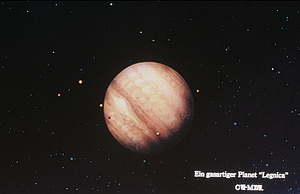Legnica
From Gineipaedia, the Legend of Galactic Heroes wiki

Legnica [leg•NEET•sa] (Japanese: レグニッツァ) is a gas giant which shares with Kapche-Lanka an unnamed starzone located in the vicinity of Iserlohn Fortress. The planet was described by Imperial sources as being a 'typical outer gas giant', and circles at a mean distance of 740,000,000 km from its sun, taking 104,000 hours to complete each orbit. It has an equatorial radius of 73,300 km, a mass of 2.000×1024 kg, and a mean density of 1.29 g/cm3. At least five satellites can be found in orbit.
Its outer atmosphere, composed mainly of helium and hydrogen, is capable of 2000 km/h winds and considerable electric interference — conditions which render ship tracking and radar nearly useless. Reinhard von Müsel took advantage of this during the Battle of Legnica; after heating the gas in the atmosphere with energy weapons, he ordered his ships to ascend and then fired a nuclear fusion missile at the planet. This ignited the volatile hydrogen gas, destroying much of the enemy's fleet. (SWV: 'Chapter IV'; My Conquest Is the Sea of Stars)
Appendices
Appearances
- My Conquest Is the Sea of Stars (first appearance)
- SWV:
- 'Chapter II' (map)
- 'Chapter IV'
Background information
Detailed information on Legnica was briefly visible on the screen of Mittermeyer's ship just prior to the battle at Legnica. The screen appears to have displayed the following:
- Ein gasartiger Planet "Legnica"
- "Legnica", ein planet, der sich in der nächtsten Ferne von der Festung Iserlon befindet, gehört zu den typischen fixsternischen Planeten mit gasförmigen Rand.
- Er bewegt sich mit der Periode von mehr als 104,000 Stunden auf der elliptischen Bahn, die von 720,000,000 bis 760,000,000 km von der Mitterfixstern entfernt ist. Sein Aquatorradius ist 73,300 km, die Masse 2.000 x 1024 t, die Darchschnittdichte 1.29 g/cm3,
The measurements provided seem to indicate that, in addition to its similar appearance, Legnica is very close in terms of size, mass, density, orbital distance, and orbital speed to the real-life planet Jupiter.
The name 'Legnica' itself (and its pronunciation, which is unusual in both English and German) comes from the town of the same name in south-western Poland.